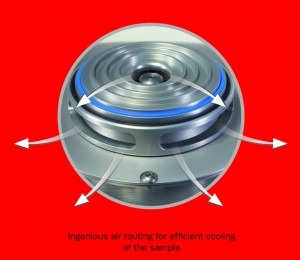
Fritsch's variable-speed rotor mill the Pulverisette 14 is able to grind soft to medium-hard, brittle and fibrous samples, including PVC, foils and leaves.
Due to its air cooling ability and 'cyclone', the machine can tackle the comminution of difficult-to-grind samples, such as temperature-sensitive powder coatings and plastic samples, or moist materials such as herbs, leaves or teas.
The air routing inside the Pulverisette 14 and the air vortex within the cyclone cools the sample during grinding, reduces the thermal load of the sample and minimises clogging of the sieve rings.
According to the company, this also reduces the cleaning of the mill to a minimum and increases throughput.
The air flow inside the cyclone leads the ground sample directly into the screwed-on sample glass.
This type of sample discharge enables the ground material to be drawn directly into the glass bottle where it can be transported, stored and removed for analysis.
The fine dust is retained in the cyclone by the HEPA dust filter.
The mill is suitable for use with heat-sensitive materials, as well as for smooth pre-crushing and fine grinding of hard-brittle to soft, fatty or samples with residual moisture.
Temperature-sensitive samples such as styrene, polyester, synthetic resins, foils, PVC, PP and PE can be embrittled by adding liquid nitrogen before grinding.
The machine features variable speed adjustment from 6,000-20,000rpm, a feed size of 10mm and a throughput of 0.05-5 litres per hour.
It can grind minimal sample quantities of 5-10ml and creates a final fineness of d50 < 40um.
Sieve inserts are 0.08-6mm.
Grinding parts can be cleaned and assembled outside the instrument and are manufactured from stainless steel and pure titanium, TiN-coated and WC-coated.





